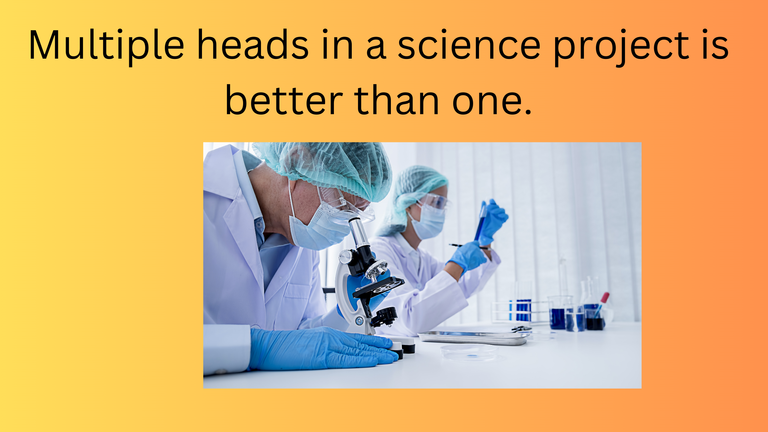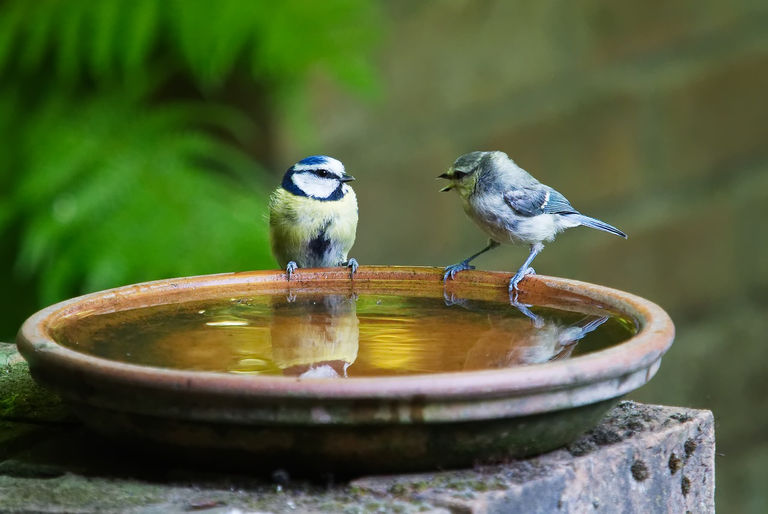Multiple heads in a science project is better than one.

In Science, there are projects that you are the only one working on that, or sometimes you are part of a team. Usually, the most successful scientific projects are the big ones in which a big team is behind them because usually, one person can't cover a whole set of different experiments to prove a good hypothesis. Well, actually a single person can perform a huge project like that, but for sure a whole team mobilized will perform it faster. In addition, multiple people can also bring ideas to solve problems. Like the famous quote “Two heads are better than one, not because either is infallible, but because they are unlikely to go wrong in the same direction.” attributed to the writer Clive Lewis.
Em Ciência, existem projetos nos quais você é o único a trabalhar neles, ou às vezes você faz parte de uma equipe. Geralmente, os projetos científicos mais bem-sucedidos são aqueles grandes, nos quais uma equipe numerosa está envolvida, porque, geralmente, uma única pessoa não consegue abranger todo um conjunto de experimentos diferentes para comprovar uma boa hipótese. Bem, na verdade, uma única pessoa pode realizar um projeto grande assim, mas com certeza uma equipe inteira mobilizada o realizará mais rapidamente. Além disso, várias pessoas também podem trazer ideias para resolver problemas. Como a famosa citação "Duas cabeças pensam melhor do que uma, não porque qualquer uma delas seja infalível, mas porque é improvável que errem na mesma direção", atribuída ao escritor Clive Lewis.

Many times during my Ph.D. thesis I went in the wrong direction, sometimes even led by my supervisor. It is normal; we have an idea and then see that it fails. During the defense and other opportunities to expose my work, many people started to give different ideas, maybe things that can work better, but these are just tips from people outside of the project. Still during my Ph.D. I was asked by my supervisor to help with a project that was mostly done but It was stuck. It was a project that belonged actually to my colleague's Ph.D. project. He was a bit lost in the organization of his data, and he was having mostly a problem writing about all the data that he produced. My goal was to find significance in his data, what genes were found, and how to associate it with cancer biology. So I mostly helped in the literature finding and running some small programs that are used to annotate the genes found to significant biological pathways, focusing on the ones that are affected by cancer. That was mostly one of my specialties, the part of the project that needed more computational effort was done, but a person with good experience in exploring data helped to give meaning to all the data. I think the interaction between me and my colleague was wonderful and we could work together very well. We had different skills and each skill contributed to the end goal of closing the project. That is how a team independent of the size should work, with contributions that are associated with their skills, and good boundaries without one stepping on the feet of the other.
Muitas vezes, durante minha tese de doutorado, segui na direção errada, às vezes até orientado pelo meu supervisor. Isso é normal; temos uma ideia e, em seguida, percebemos que ela não funciona. Durante a defesa e outras oportunidades de expor meu trabalho, muitas pessoas começaram a dar diferentes ideias, talvez coisas que poderiam funcionar melhor, mas essas são apenas sugestões de pessoas externas ao projeto. Ainda durante meu doutorado, meu orientador me pediu para ajudar em um projeto que estava em grande parte concluído, mas estava parado. Era um projeto que pertencia, na verdade, ao projeto de doutorado do meu colega. Ele estava um pouco perdido na organização de seus dados e tinha principalmente um problema para escrever sobre todos os dados que ele produziu. Meu objetivo era encontrar significado em seus dados, quais genes foram encontrados e como associá-los à biologia do câncer. Assim, ajudei principalmente na busca bibliográfica e na execução de alguns programas pequenos usados para anotar os genes encontrados em vias biológicas significativas, focando nas que são afetadas pelo câncer. Isso era principalmente uma das minhas especialidades; a parte do projeto que exigia mais esforço computacional já estava feita, mas uma pessoa com boa experiência em explorar dados ajudou a dar significado a todos os dados. Acredito que a interação entre mim e meu colega foi maravilhosa, e conseguimos trabalhar muito bem juntos. Tínhamos habilidades diferentes, e cada habilidade contribuiu para o objetivo final de concluir o projeto. É assim que uma equipe, independentemente do tamanho, deve trabalhar, com contribuições associadas às suas habilidades e boas fronteiras sem que um interfira no trabalho do outro.

I had a very other interesting experience, interesting experience doesn't mean that it was good! I was a collaborator in a project to identify small non-coding genes in Salmon, I was working mainly with human cancer at the time, but when we are talking about genetic code exploration we use similar tools in any type of organism, what mostly changes is how we interpret the data. I did all the analysis requested and we submitted the article to a known journal, it came with some reviews and they requested an extra analysis.
The first author decided to contact a former collaborator who was a specialist in Salmon genes to perform this analysis that he performed previously in other works. I was okay with that since it wasn't an analysis that I was used to doing and also I had other things to do. However, the researcher started to question things that I already made, and why I decided to go through this workflow. I explained to him with citations and previous works done. He started to argue that this way was wrong and the method that he used was better ( he showed a previous article published by him). I told him that either way works as expected.
In bioinformatics, sometimes you have multiple tools that bring you similar results, the way to do is different but the results are similar ( that's a thing for sure the results won't be 100% equal, but still the majority of the findings will be there using either ways). During my master's, I compared 3 different tools that were used to identify copy number variation of genes in Bladder cancer tumors, and all three tools gave me the most significant results, which were the ones to be considered as a priority to be used as a biomarker. Anyway, this researcher insisted on his opinion, and since he was a senior researcher with a tight bond with the first and last author of the article that we were going to publish, I decided to let it go and let him re-do all the analysis that I did with his own workflow. In the end, he found similar expected results. I got very pissed with this attitude but I couldn't do much, I only at first showed my opinion, but since my opinion was lost against the group decision, I had to step away with my opinion. That is how it works. In the end, I was relieved that the article was published and this little nightmare ended. Still, I think that it was important to learn how to deal with an opinion that even knowing that it was going to be a waste of time, I accepted to give up for the good of the group's health.
Eu tive uma experiência muito interessante, embora "interessante" não signifique que tenha sido boa! Eu era colaborador em um projeto para identificar pequenos genes não codificadores em salmão. Na época, eu estava trabalhando principalmente com câncer humano, mas quando se trata de exploração do código genético, usamos ferramentas semelhantes em qualquer tipo de organismo. O que muda principalmente é como interpretamos os dados. Realizei toda a análise solicitada e submetemos o artigo a uma revista conhecida. Recebemos algumas revisões e eles solicitaram uma análise adicional.
O primeiro autor decidiu entrar em contato com um ex-colaborador que era especialista em genes de salmão para realizar essa análise, que ele já havia feito em trabalhos anteriores. Eu concordei com isso, já que não era uma análise com a qual eu estava acostumado e também tinha outras coisas para fazer. No entanto, o pesquisador começou a questionar coisas que eu já havia feito e por que eu decidi seguir esse fluxo de trabalho. Expliquei a ele com citações e trabalhos anteriores realizados. Ele começou a argumentar que esse caminho estava errado e que o método que ele usou era melhor (ele mostrou um artigo anterior publicado por ele). Eu disse a ele que ambos os métodos funcionam como esperados.
Na bioinformática, às vezes você tem várias ferramentas que fornecem resultados semelhantes; a maneira de fazer é diferente, mas os resultados são similares (isso é certo, os resultados não serão 100% iguais, mas ainda a maioria das descobertas estará lá usando qualquer abordagem). Durante meu mestrado, comparei três ferramentas diferentes usadas para identificar variações no número de cópias de genes em tumores de câncer de bexiga, e todas as três me deram os resultados mais significativos, que deveriam ser considerados como prioridade para serem usados como biomarcadores.
De qualquer forma, esse pesquisador insistiu em sua opinião, e como ele era um pesquisador sênior com laços estreitos com o primeiro e último autor do artigo que íamos publicar, decidi deixar para lá e deixá-lo refazer toda a análise que fiz com seu próprio fluxo de trabalho. No final, ele encontrou resultados esperados semelhantes. Eu fiquei muito irritado com essa atitude, mas não pude fazer muito; inicialmente, expus minha opinião, mas como minha opinião foi perdida contra a decisão do grupo, tive que me afastar com minha opinião. É assim que funciona. No final, fiquei aliviado que o artigo foi publicado e esse pequeno pesadelo acabou. Ainda assim, acho que foi importante aprender como lidar com uma opinião que, mesmo sabendo que seria uma perda de tempo, eu aceitei desistir pelo bem da saúde do grupo.
Posted Using InLeo Alpha
Obrigado por promover a comunidade Hive-BR em suas postagens.
Vamos seguir fortalecendo a Hive
Once you have to deal with others, you know at once that you'll have to deal with opinions that you may not like. It's a part of life. So, when we come up on such moments, it's vital we react with maturity, instead of ruining the whole thing for everyone. You did the right thing by choosing to step away. Nothing was stopping you from digging your heels in and choosing to keep fighting. But you knew it would lead nowhere and so, there's no point to it.
Smart choice...😇
Well, I will be frank, before an action I chatted with an experienced researcher at my work, who helped me to support this decision. One thing that I learned is that you can just swallow your opinion without exposing it first. But also we need to know when to step away. I just read a post from @offia66 and he mentioned that a guy that didn't want to give up of his opinion delayed the work from his group. When you are working in a group you need to have another mentality.
Having more people in a team has as advantage that there are more visions :D
As someone not working in science, having more visions often makes it harder to find a consensus / make decisions though.
Guess a good balance has to be found for every situation with enough opportunities to get feedback / a critical view!
Well-written article! :D
that is the most important thing, being mind opened to feedback is important.
Your post was manually curated by @KaibaGT.
Delegate your HP to the hive-br.voter account and earn Hive daily!
🔹 Follow our Curation Trail and don't miss voting! 🔹
Você passou por situações que mostram como é a arte de expressar a opinião ou conversar sobre algo. Algumas pessoas aceitam bem e assim a sua equipe de trabalho por exemplo evolui e faz as coisas mais rápido e melhor, claro que também encontramos as pessoas que não aceitam argumentar ou pensar em um ideia e agregar o valor de cada pessoa.
No meu trabalho é tenso, por mais que eu tente dar uma opinião sensata sobre as coisas dificilmente sou ouvido. Acho isso ruim =/
Having people are are visionary in a team is always good because it will help you to achieve your aims faster
You people may not even be up to seven but as long as the brains are working and there is a cooperation, things will work fine